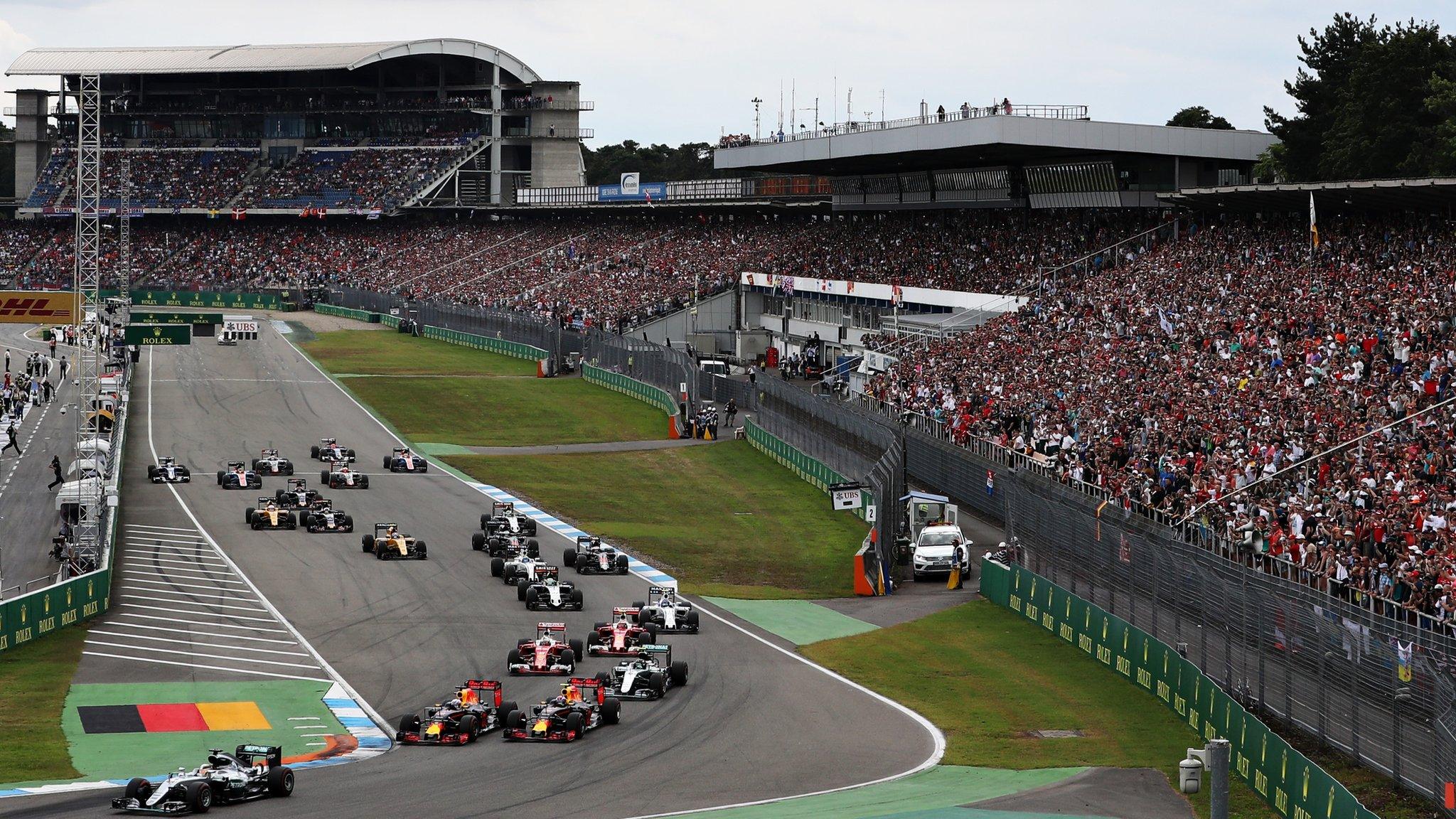Lewis Hamilton: Mercedes need him, so how do they manage Abu Dhabi fallout?
- Published
- comments
Will Rosberg and Hamilton become best of friends, again?
There is no such thing as an easy ride when it comes to dealing with Lewis Hamilton.
Mercedes F1 boss Toto Wolff has long been aware of that truism, and after the Abu Dhabi Grand Prix he heads into the off-season this winter with another problem on his hands - what does he do about Hamilton's actions at Yas Marina?
In attempting to win the championship by driving slowly to bring rivals into the private battle between himself and team-mate Nico Rosberg, Hamilton repeatedly disobeyed team orders not to slow down too much.
From Mercedes' point of view, it all ended well - Hamilton won the race, Rosberg finished second to clinch the title, having navigated his way through what he described as an "intense" 90 minutes or so.
But it leaves the team with a conundrum - what to do about Hamilton's disobedience, and how does it affect them going into next season?
The core problem
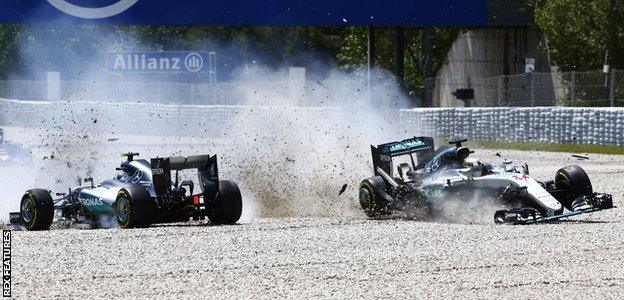
The two Mercedes drivers collided on the first lap in Spain (pictured) and the last lap in Austria
There is one central issue that Wolff has not addressed in public - he and Mercedes need Hamilton.
For one thing, he is F1's biggest star and he gives the Mercedes brand an appeal to an audience demographic it otherwise struggles to reach.
For another, he is the fastest driver in the world and F1 is heading into a season with a major regulation change and no guarantee that Mercedes will continue to have such an advantage over their rivals.
One can argue that if you give the best team of the past three years, with demonstrably the best engine, new aerodynamic rules that increase drag and therefore make power even more important, they are likely to continue on top.
On the other hand, history suggests that when rules change, the man who gets it right more often than not is Adrian Newey - the design chief of Red Bull. And after three years, with a major engine redesign coming from the French company, their partner Renault could catch up Mercedes.
Hamilton is an emotionally driven character, who has been on a personal roller coaster this year because of his reliability problems, and who has admitted he reached "rock bottom" after his crash with Rosberg at the Spanish Grand Prix, when he was 43 points off the championship lead.
With the threat of a resurgent Red Bull, and their ultra-strong driver line-up of Daniel Ricciardo and Max Verstappen, Wolff needs his team in the best possible shape in 2017.
And that means finding a way to handle this while keeping Hamilton happy.
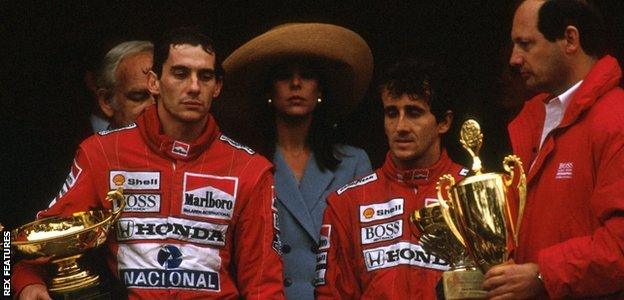
"Enjoy that dominant Monaco win, lads?" Not since Prost and Senna in the late 80s has a team had to manage such a delicate balancing act
What's the problem?
On the eve of the race, Wolff pledged "not to interfere" in the battle between Hamilton and Rosberg "as long as they are not overstepping the mark in terms of what we see as sportsmanlike driving".
What he meant - although he did not say it at the time - was that he did not want to see Hamilton backing Rosberg up to the extent that it could affect Mercedes' ability to win the race.
Many observers, including senior insiders from other teams, feel Hamilton never actually stepped over that line, in that he was always in the lead and always in control and the victory was never in doubt - a point Hamilton himself made over the radio to the team.
But the team insist that was not the case. They say there were two moments when the win was at risk - when Red Bull's Verstappen was running second to Hamilton and ahead of Rosberg and it became clear the Dutchman was on a one-stop strategy; and later in the race when Ferrari's Sebastian Vettel was closing in rapidly on fresh super-soft tyres.
Rivals feel Mercedes' claims that the win was under threat were disingenuous - Hamilton had so much pace in hand he could simply have sped up.
However, Mercedes say their strategy software said otherwise, hence their interventions to Hamilton - which went as far as executive director (technical) Paddy Lowe coming on the radio with an "instruction" to "pick up the pace to win this race". Lowe's intervention is the "highest escalation" of team orders, Mercedes say.
Hamilton's response? "I'm in the lead right now. I'm quite comfortable where I am."
Did Hamilton do anything wrong?
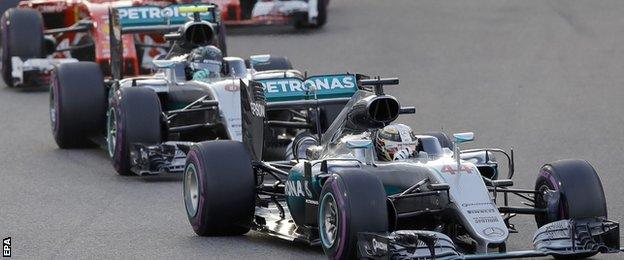
Hamilton deliberately slowed down at the end of the race in Abu Dhabi to back Rosberg into rivals
From the perspective of a racing driver, Hamilton did nothing wrong. He had two options going into the race - disappear into the distance to make a point about him being the fastest driver whose season had been affected by bad luck; or try to get rivals in between him and Rosberg.
He chose the second and in doing so he broke no rules. It could be argued - indeed it was argued by Mercedes insiders - that taking the first choice would have been to claim the moral high ground. But what does Hamilton care about that when a world title is at stake? His view was: it's not cheating, so it's not a problem.
Even those inside Mercedes would admit that Hamilton was relatively gentle with Rosberg. He drove slowly all race, but could have done so much more aggressively and much earlier on.
Even during the closing laps, when he began to turn the screw, he only just managed to get Vettel on to Rosberg's tail on the final lap - although the suspicion is that Vettel had already made a decision not to get involved, which raises its own questions of morality.
Ask any racing driver and he would tell you there were many other options Hamilton could have chosen that would have had a much more dramatic effect.
It's almost as if he was fighting his own moral battle in his head while he was out there - do something, just don't do too much.
If so, it would be in keeping with his racing character. Hamilton is a hard racer but through his career he has generally been scrupulously fair. Not for him the darker arts of someone like Michael Schumacher, or even Ayrton Senna.
Should there have been team orders?
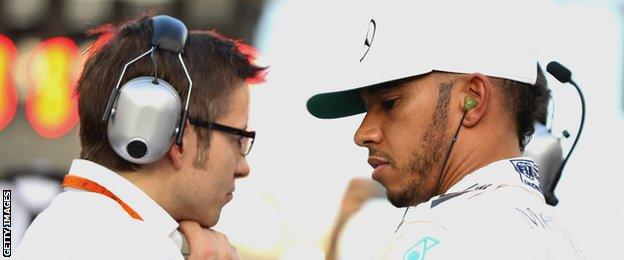
"I suggest you let us race" was Hamilton's response to his Mercedes team's orders
Mercedes view his actions through the prism of what they call their "team values and ethics".
"Undermining a structure in public means you are putting yourself before the team. And anarchy doesn't work in any team or company," Wolff said.
However, he added: "It was his only chance of winning the championship at that stage and maybe you cannot demand a racing driver who is one of the best - if not the best out there - to comply in a situation where his instincts cannot make him comply.
"It is about finding a solution how to solve that in the future because a precedent has been set."
Others would contend that there was no place for team orders in this context. Mercedes were already assured of the drivers' and constructors' titles, it was just a question of which driver was champion. Not even a crash that took both out of the race would have affected any of that.
But the team say you cannot pick and choose when to apply those values - it's no different at the last race than the first. After all, every race counts for the championship.
The unsolvable conundrum?
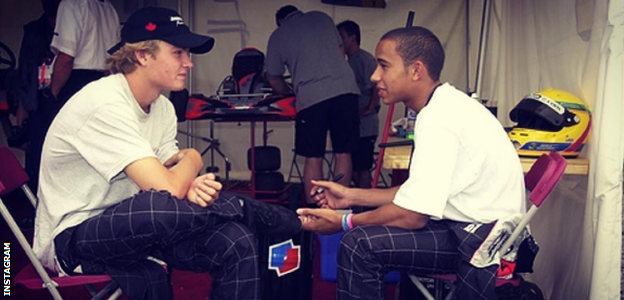
Hamilton has since posted a message on Instagram: "We said we'd be champions back then, now we both are! Congratulations Nico, you did everything a champion needed to do. Well deserved"
The issue is what to do now? Wolff is taking his time to think the matter over and as he does so, a number of factors will come into play.
The first is that Mercedes are facing here a situation with which no team has been confronted since McLaren with Senna and Alain Prost in 1989.
Ron Dennis' inability to handle that dynamic led to an implosion - Prost signed for arch-rivals Ferrari and the title was decided in a collision between the two drivers in Japan.
A not dissimilar situation arose when Dennis failed to handle the tensions created when Hamilton and Fernando Alonso were team-mates in 2007.
Wolff is keen to avoid falling into that trap. But, realistically, what can he do?
After Rosberg and Hamilton collided in Austria for the second time in five races, he threatened both with suspension if it happened again. However, that's not what happened in Abu Dhabi.
So a suspension can surely be ruled out - despite Wolff's post-race remark that "everything is possible".
In time, Wolff will probably sit down with Hamilton and discuss it. But what then?
Wolff said: "Throughout these last three years we have really tried to create an environment and a set of values in the team and one of the reasons is the individuals in this team are very much part of it.
"They bought into these values. You cannot invent a rule for every single situation. This is motor racing and it would make it the most boring sport ever if we would have a corporate solution for every single situation.
"The tricky bit here is what does that mean for the future of the team and how can we progress and not be over-corporate and boring but allow them to race?
"It wasn't acknowledged that we have let them race over the last three years.
"We could have had a much smoother run and decided that 'you are going to win or you are' and this is how it happened in Red Bull and in Ferrari many years ago and how it happened many years in other teams.
"We are not here in the credit-taking business because it needs headlines - but I think we have coped quite well with this situation the last three years."
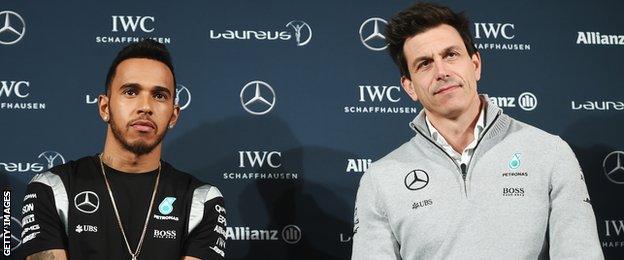
Any decision on Hamilton's conduct may not be made until the new year
- Published29 November 2016
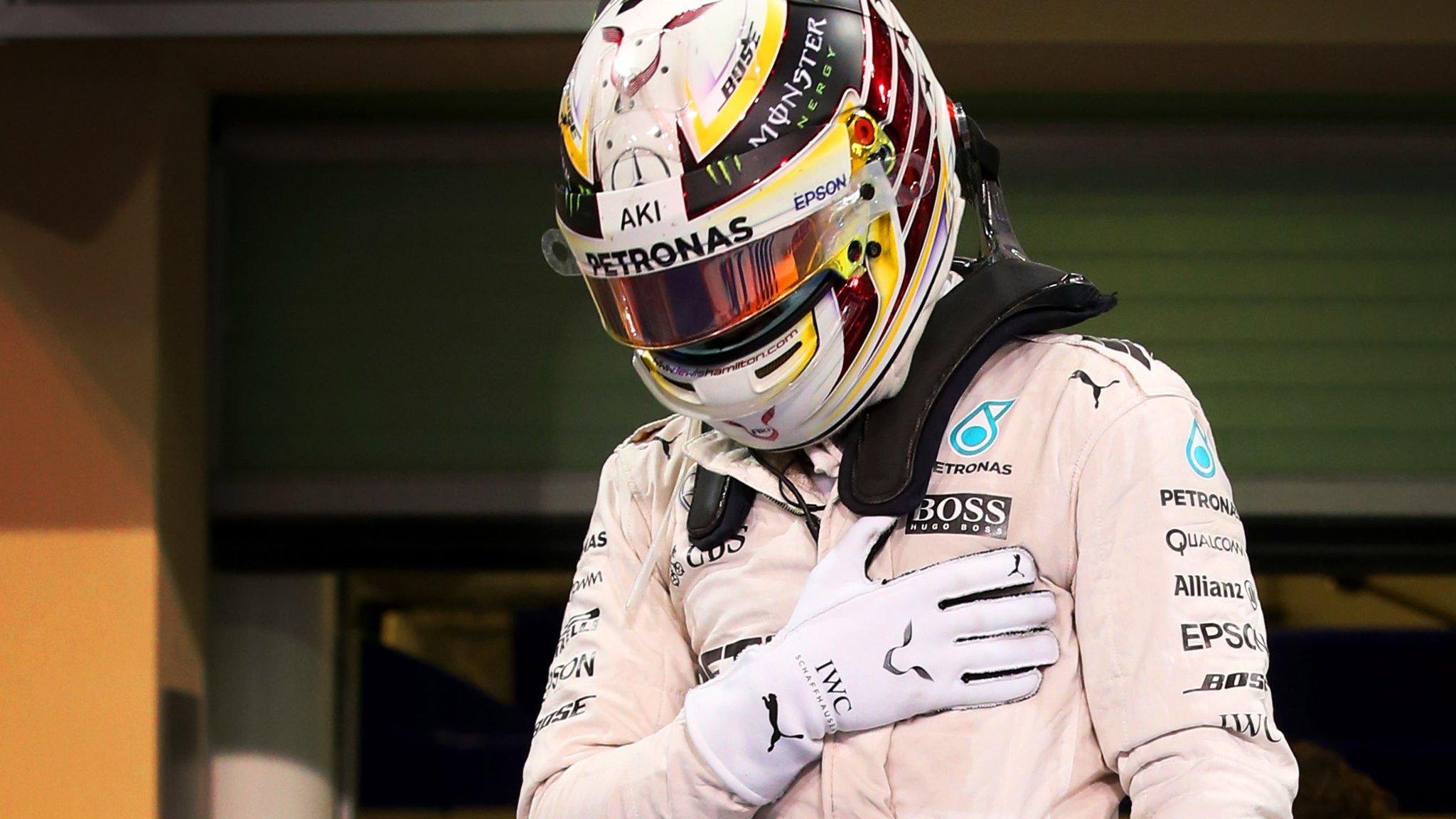
- Published27 November 2016

- Published29 November 2016
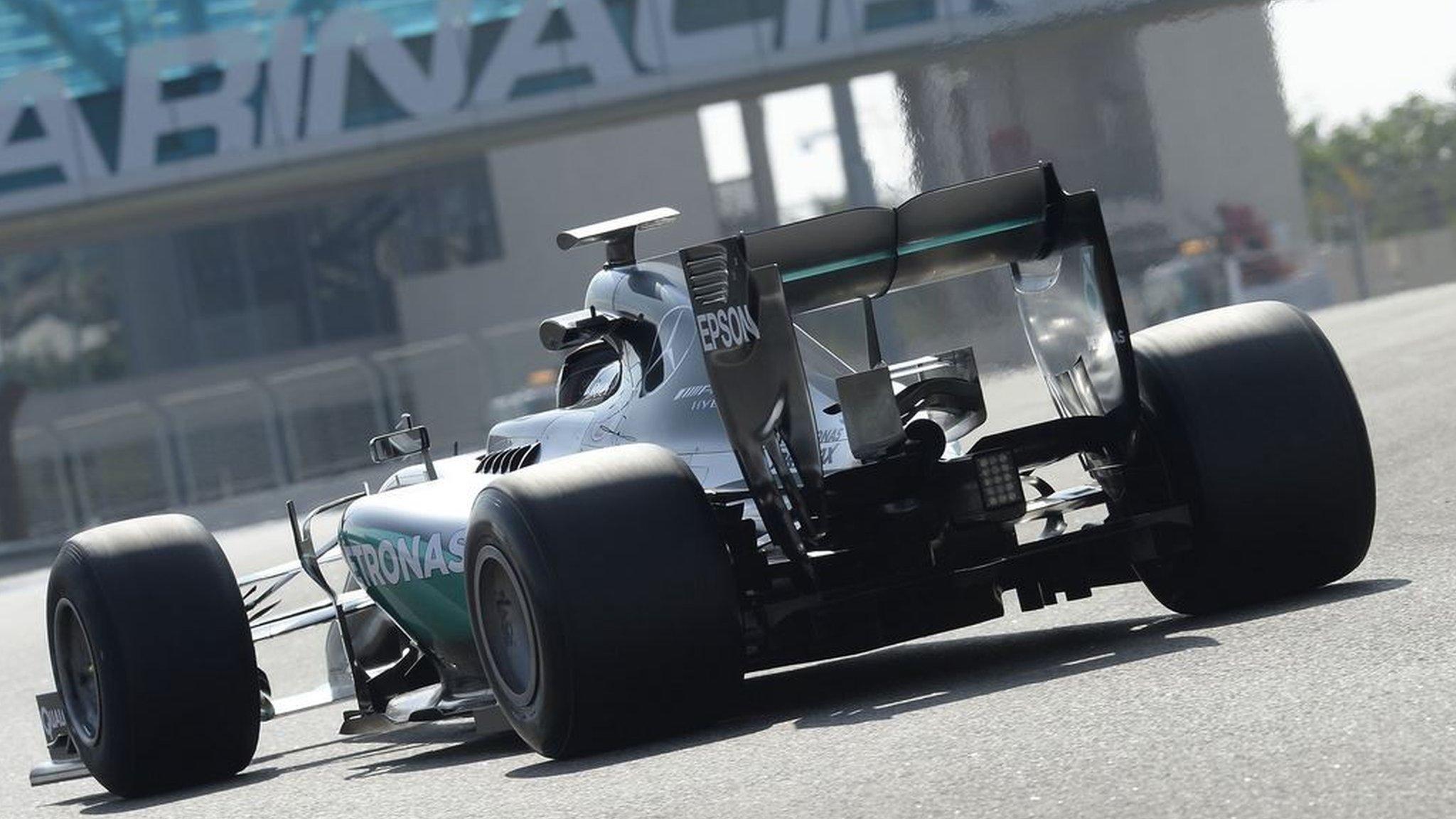
- Published30 November 2016
